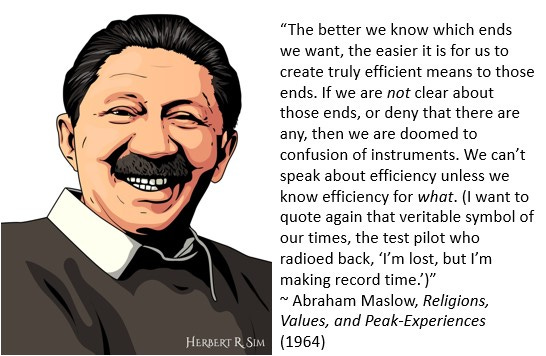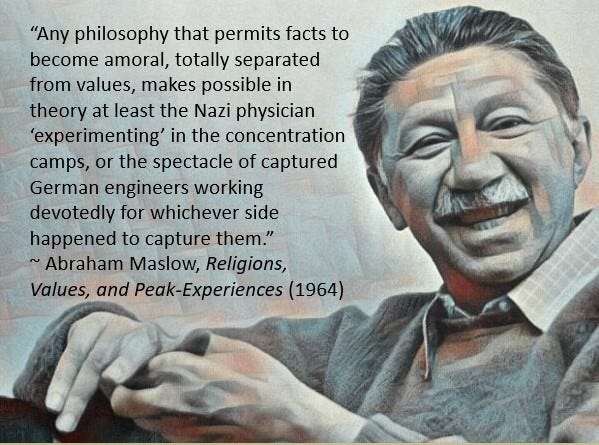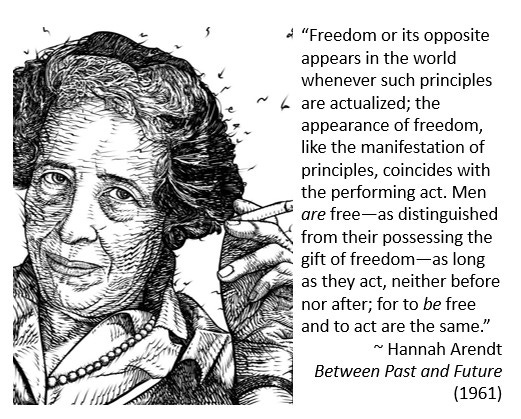Embodying the Good
The Intrinsic Value of Opposing Unjust War
A case can be made that the peace movement succeeded in generating positive results, even as it failed in its primary aim of preventing the Iraq War. But this impact is not the most important and meaningful aspect of the peace movement.
The finiteness of existence and inevitability of defeat by the swinging pendulum of life presses us to anchor the meaningfulness of our lives and actions in something still deeper and weightier than utility: ways of being that are in-themselves good. Where the peace movement was most accomplished was in exemplifying values and characteristics of being that were themselves good.
To grasp the deeper significance of the peace movement requires drawing insight from the humanities. Great philosophers and spiritual leaders have consistently highlighted the absurdity of finding life’s value only or primarily in a perpetually retreating horizon rather than locating excellence, joy, beauty, and meaning in the present. Sadly, many in our society have been taken in by an ideology that would have us believe that the only things that have true worth or significance are those that “generate” wealth, status, or some other “useful” effect. Such a line of thought is proven absurd when we come to terms with the fact that none of our generative efforts allow us to evade the grave or to achieve irreversible progress.
Dominant culture insists that the worth of our lives and actions is determined only in narrowly defined relation to “results” and “achievement.” Such a view of existence is rooted in a transitory, transactional worldview oblivious to the fact that nothing can be deemed useful or even successful less it is pinned to something valued for its own sake, what philosophers refer to as the “ends” of life and religious figures like Rev. Dr. Martin Luther King, Jr. called the spiritual “within” of life.
Too many fail to understand that we cannot determine whether or not something is useful without a clear sense of what overarching purpose we wish to not merely achieve but experience. Something can only be deemed “useful” in relation to something valued for its own sake, without further resort to its usefulness toward yet another useful object or achievement. Philosopher Bertrand Russell wrote,
“If human life is not to become dusty and uninteresting, it is important to realize that there are things that have a value which is quite independent of utility. What is useful is useful because it is a means to something else, and the something else, if it is not in turn merely a means, must be valued for its own sake, for otherwise the usefulness is illusory.”
Russell’s point is that things are only useful if they are in the service of things or experiences that are good in their own right. Humanistic psychologist, Abraham Maslow made much the same point when he wrote,
“The better we know which ends we want, the easier it is for us to create truly efficient means to those ends. If we are not clear about those ends, or deny that there are any, then we are doomed to confusion of instruments. We can’t speak about efficiency unless we know efficiency for what. (I want to quote again that veritable symbol of our times, the test pilot who radioed back, ‘I’m lost, but I’m making record time.’).”
The failure to recognize the cultural-social-ethical significance of the peace movement against the Iraq War is a symptom of a widespread ideological pathology: the prioritization of extrinsic value over intrinsic value. Something has intrinsic value when it is good in its own right. By contrast, something is extrinsically valuable if its worth is found in something else, what it leads to or enables. A cup, laptop, chair, pencil are extrinsically valuable things. A person, on the other hand, has intrinsic value—dignity. So, too, does an embrace between loved ones, or the joy of dancing to a jubilant, rhythmic song. Whatever else they might generate, such as weight loss, stress reduction, etc., these experiences are good in themselves.
To pretend human beings can be existentially sustained on facts alone is to ignore the basic human need of meaning; such single-minded devotion to facts, furthermore, makes the way for amoral alliances to evil.
Recognizing that some experiences and ways of being are self-justifyingly good—intrinsically valuable—allows us to find reason for living and growing in the face of the ultimate futility of life. The humanities uniquely honor the merits of contemplating those values that animate our lives with purpose and meaning, even as we face humanity’s shared destiny of oblivion—death. Specifically, the humanities offer a fuller context with which to judge the peace movement, allowing us to recognize the intrinsic good in exemplifying our most cherished convictions including the love of life—biophilia—love of truth and love of justice.
The Peace Movement’s B-Values
Against spoken and unspoken appeals to power, apathy, impotence, and fatalism, the millions who joined the movement against war exemplified quintessentially human values including truth, justice, autonomy, and integrity. These values are what Maslow named “B-values”: states of being that are intrinsically good, good-in-themselves, or ends unto themselves. These values, along with others like them, constitute the fundamental worldview through which meaning is determined.
Historically, human beings have relied upon religion to supply us with such a framework for devotion. Whatever our relationship to organized religion, the fact remains that human beings require a set of intrinsic values constituting a rubric through which to determine what is useful or not, right or wrong, good or bad, important or unimportant. Such a fundamental framework of life enables us to be oriented—to live with and by principle—even as we stand besieged by the complexities of our conscious human existence. To pretend human beings can be existentially sustained on facts alone is to ignore the basic human need of meaning; such single-minded devotion to facts, furthermore, makes the way for amoral alliances to evil. As Maslow so profoundly expressed the point:
“Any philosophy that permits facts to become amoral, totally separated from values, makes possible in theory at least the Nazi physician ‘experimenting’ in the concentration camps, or the spectacle of captured German engineers working devotedly for whichever side happened to capture them.”
Participants in the peace movement exemplified truthfulness in refusing to accept the barrage of rationalizations for war from those in political authority and in mainstream media. They rejected appeals to power and fear, and affirmed and exercised critical, independent thought, even as many of their fellow citizens fell prey to such uncritical thought.
Peace advocates manifested, and thus gave life to, elementary moral concepts such as the principle of universality, demanding that the rules applied to others—in this case, nations—also be applied to themselves—their own nation. If U.S. civilian life was precious, then, so too, was Iraqi civilian life. If it was wrong for a foreign government or group to launch an attack on us, preemptively, then so, too, was it wrong for the U.S. to preemptively attack Iraq. Peace activists insisted on recognizing and accounting for the dignity and rights of Iraqi people at a time when many in the U.S. perpetuated dehumanizing, ethnocentric stereotypes of Muslim and Arab people and the morally polarizing language of “us” against “them.” The peace movement vigorously affirmed the ethical principle of moral equality, the idea that all people are of equal moral worth regardless of their ethnic differences.
Activists embodied integrity as well. Rather than inactively professing commitment to nonviolence and moral equality from the political sidelines, millions deviated from their normal lives to align their actions with their beliefs about the Iraq War and human rights. Whatever else resulted, this much we know about the movement to stop the Iraq War: millions of human beings ceased, at least temporarily, to be politically managed, to be condescendingly directed by mass media, in a word, we ceased to be things. Instead, participants chose authenticity, empathy, independence of thought, truth, and courage over alienated conformity and resignation.
Justice is not something to wait for or to eventually have. The principle of justice is enlivened in the human world only when we enact it; when our sinews and muscles incant our ideals into being.
Participants refused to abide by the inane, inhumane dictates of paternalistic power. They refused to be silent, passive, or complicit. Instead of being bystanders, activists chose to be agents, registering their dissent against war and allegiance to human dignity, justice, and reason. And these, my dear reader, are good ways to be. They are among the best characteristics of humanity. Whatever else they produce or inspire, whatever wins or losses they generate, we must refuse to accept the lie that their exemplification is not noble, beautiful, and good, in themselves.
In acting upon their commitment to truth, justice, civic freedom and autonomy, and integrity, activists embodied cherished human values. Such values are not things that exist outside of us. They are ideals which come into existence in the world, into being as virtues, only insofar as we embody and therefore enliven them in our character, as life-shaping habits of thought, feeling, and action. As the philosopher Hannah Arendt explained in Between past and Future (1961),
“Freedom or its opposite appears in the world whenever such principles are actualized; the appearance of freedom, like the manifestation of principles, coincides with the performing act. Men are free—as distinguished from their possessing the gift of freedom—as long as they act, neither before nor after; for to be free and to act are the same.”
Neither are these values just far-off-goals, something to merely achieve or possess in a distance future. We do not attain the future goal of a just society, for example, without thinking, feeling, and behaving justly, in the world. Justice is not something to wait for or to eventually have. The principle of justice is enlivened in the human world only when we enact it; when our sinews and muscles incant our ideals into being.
Rejecting Defeatism
There is no denying that the peace movement failed in its aim of stopping the Iraq War. The “shock and awe” campaign left activists heartbroken and dejected. We cared about the innocent lives being destroyed by our own government, with machines of war we paid for as taxpayers. Some resigned themselves to the war, figuring nothing could be done once the bombs began to fall. Still many others refused to accept the war and continued to protest, educate in their community, and advocate against militarism.
The lead singer of the heavy metal band, System of a Down, Serj Tankian, expressed this mixture of disappointment about Iraq and ethical resilience when I interviewed him 2004. “The war affected me deeply,” Tankian told me over the phone. “You had millions of people protesting a war that wasn’t actually going on.” Tankian and his bandmates marched against the Iraq War in the February 15 mobilization. They even made a music video for their anti-war song, “Boom,” featuring footage from February 15 protests around the world. Like so many, the failure to prevent the war left Tankian with mixed feelings but resolved to promote change.
“Our inability to stop [the Iraq War] and how it went on to happen is the really interesting point. I think in some ways it made me very skeptical and, in some ways, it made me more determined.”
But Tankian refused to let the failure to stop the Iraq War prevent him from doing the good within his power to do. Following the launch of the war, he helped create Axis of Justice, a collaborative civic project put together with social justice campaigner and famed Rage Against the Machine guitarist, Tom Morello. The project, named as a parody of President Bush’s “Axis of Evil,” promoted voter registration, issues-based education, and social-political engagement among music fans.
The failure to prevent the Iraq War led many in the peace movement to feelings of impotence and doubt. Yet many refused to resign themselves to defeatism and continued to promote the values of human dignity, freedom, and justice at the heart of the movement against the Iraq War. Such efforts have born much fruit. Arguably many, today, think more critically about U.S. military policy than would have without the immense efforts of countless educators, advocates, students, veterans, religious leaders, union members, and others comprising the peace movement. Yet such results should not be the single metric used to measure the meaningfulness of the peace movement. There is something inherently good in exemplifying, as opposed to simply abstractly professing, a commitment to truth, justice, freedom, and integrity by aligning their actions with their foremost principles.
Read Part Three Below
If you enjoyed this post please share it with others and like it by clicking the heart icon. Be sure to subscribe if you haven’t already.
Invite Dr. Nall to Speak
Dr. Nall delivers energetic live presentations and engaging workshops on the subjects featured in Humanities in Revolt. Those interested in booking a workshop or talk can get in touch through Facebook or by leaving a comment.









A great post. I'm a big fan of Arendt, so thank you for bringing her thoughts to the party. As an expat, I'm not feeling too good these days ....